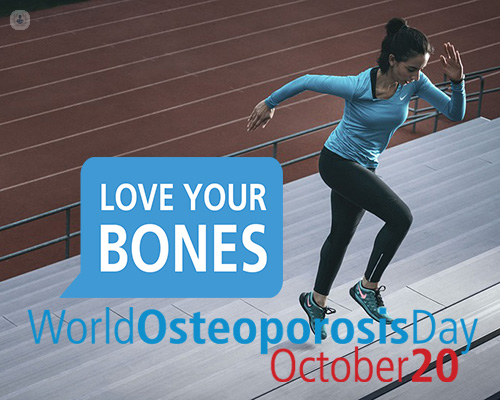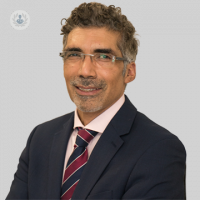Osteoporosis: are you at risk?
Written by:In preparation for World Osteoporosis Day on the 20th of October, we asked Dr Taher Mahmud of the London Osteoporosis Clinic why bone health is important, and what we can all do in our everyday lives to help prevent osteoporosis.

Dr Mahmud and the London Osteoporosis Clinic are holding a special osteoporosis and menopause information day on the 20th, with a drop-in clinic to advise on bone health and talk about the clinic’s work. They will also be offering discounted DEXA scans to assess bone density.
TD (Top Doctors): Dr Mahmud, how common is osteoporosis?
DM (Dr Mahmud): Osteoporosis is actually much more common than people think. It is often associated with old age, and in fact many people associate it with women rather than men. While it’s true more women are affected, bone fractures affect 1 in 5 men over the age of 50, so the risk is there. For women, the risk is even greater, with 1 in 2 over the age of 50 affected. You can see from these statistics alone that osteoporosis is not at all rare, and it is important for us to be aware exactly how many people are affected so we can work together to try prevent the multitude of fractures occurring.
TD: How do you know if you have osteoporosis?
DM: The thing is, osteoporosis is usually silent and does not display any symptoms in its early stages. As we age, our bone mass decreases and our bones progressively weaken, but you may not be aware of this until you actually experience a fracture. Some of the symptoms which occasionally develop include a gradual loss in height along with a stooped posture, and intermittent back pain.
TD: Why are bone health check-ups so important?
DM: Because osteoporosis is silent, it is important to assess your risk factors and speak to your healthcare provider if you suspect you may be at risk of developing osteoporosis in the future. If a direct family member has osteoporosis, or has experienced fractures, this may indicate that you are more at risk of osteoporosis. Other factors to consider include smoking, excessive drinking, or having already fractured a bone. We usually recommend bone scans to be taken over the age of 50 to assess bone health and state, but bone scans can also be taken earlier, especially if risk factors are present.
These bone scans can give you a fair indication of your bone strength, and help your healthcare specialist decide on a course of action. If you have early indication of osteoporosis, bone check-ups can help identify this, and we can act accordingly.
TD: Is osteoporosis preventable?
DM: The good news is that we can all help to reduce our risk of developing osteoporosis, even with simple changes in lifestyle. Our bones change throughout our life, but there are a number of factors that increase and reduce their strength. Nutrition is a key factor is increasing strength, particularly your intake of vitamin D and calcium. Getting enough exercise and being active is also important – we recommend at least 30 minutes a day.
If you are inactive, smoke, drink excessively, or take medication such as steroids, these can all be contributing factors to bone weakness, meaning the likelihood of fractures is greater. Certain medical conditions like arthritis, diabetes, and inflammatory bowel disease can also increase the risk. If you have any of these conditions it is important that you get appropriate treatment which in turn will reduce the negative consequences on your bone health.
TD: What if I have osteoporosis? Can it be treated?
DM: Prevention is always better than cure, but in some cases it is not possible to completely prevent osteoporosis. Osteoporosis can fortunately be treated in a number of ways, the foundation of which being lifestyle changes, which will be advised by your healthcare provider. We can also prescribe drug and non-drug treatments to help deal with osteoporosis and try to prevent fractures. In some cases we can even reverse osteoporosis, so the earlier it is found, the better. This is why we are always keen to advocate bone health and awareness, and promote understanding of the effect osteoporosis has on society.
Learn more about osteoporosis through Dr Mahmud’s previous articles for Top Doctors and on his clinic website.


